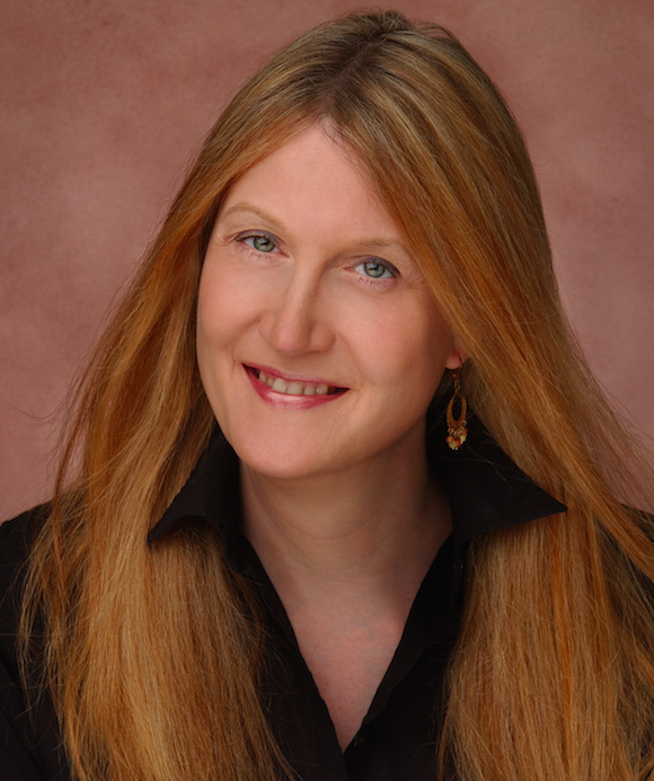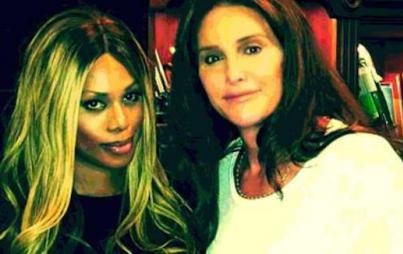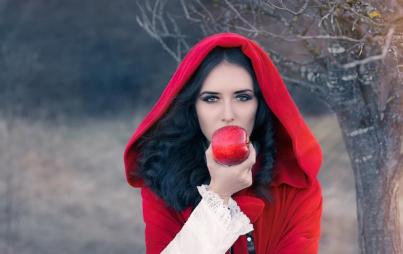
As the world watches Caitlyn Jenner's story unfold, trans women have never had more visibility than they do now. They've also never faced more violence than they do now. Author, activist, and I Am Cait costar Jennifer Finney Boylan knows a lot about trans lives — she lives one of them. She has worked as an activist in the LGBT community for many years, and is now a consultant and member of the cast of Caitlyn Jenner's reality TV series.
Her passion for spreading awareness about such an important topic instantly caught my eye, but her book is what delivered the most impact. She's Not There, Boylan's first in a series of three memoirs, chronicles her transition. The story itself is compelling, but the prose is something to be reckoned with. I found myself pausing between paragraphs to catch my breath, sometimes from laughing so hard at Boylan's dark humor that tears streamed down my face. There were tears of the other kind too, but I am happy to report that Jenny Boylan seems to have gotten a very happy ending — although I doubt you could say her story has really ended at all. She's got a lot going on, and I'm sure she has a lot in store for us. She was kind enough to let me call her up and we had so much fun. We talked about everything from gender to spirituality to Lord of the Rings. So all the important stuff.
I hope you enjoy reading our discussion as much as I did having it. Presenting an interview between Jenni and Jenny.
I read your book in like two sittings. It was fantastic, and I loved it.
Hey, no fair, man! It took me years to write that damn thing. I mean, you could have spread it out over a week!
What has your experience been like working with Caitlyn Jenner on her new show?
It's interesting. I think many people, especially in the transgender community, were a little uncertain about what it was going to be. I think there was some fear that it was going to suck, just because the Kardashian world didn't necessarily seem like an obvious perfect fit with the very serious and complicated world of transgender people's struggle for identity.
I think Cait really is genuinely desirous of making positive cultural change possible, which might sound surprising coming from a conservative Republican, but in fact she really is dedicated to that, and I think her eyes have been opened by what she's seen and by the struggles that she's witnessed and had to go through.
Yeah, and I think it's not just liberal Democrats who are transgender. It doesn't really work that way.
Exactly, or who are gay men or lesbians or bisexuals for that matter.
It's complicated, because it's a matter of recent political history that conservatives have largely tried to impede some progress for LGBT people, and yet some of the people who identify as LGBT are themselves also conservatives. It's definitely complicated.
Anyway, in some ways the most important thing that I think the Caitlyn Jenner show has accomplished is visibility. I went to the Boy George concert at the Greek Theater with her, and as we entered that stadium there were thousands of people shouting, "Caitlyn, Caitlyn, Caitlyn," like she was a rock star. Here are people chanting for a transgender woman. It's insane. I've seen nothing like that before.
I always like to quote my mother, "It's impossible to hate anyone whose story you know." The thing about Caitlyn Jenner is, the morning after that Diane Sawyer interview back in April, everyone in the country knew someone who was transgender suddenly. I'll tell you what's wacky. I've been doing this work for a dozen years now, and I've written a best-selling book, I'm a columnist for the New York Times, and blah blah blah, but I've only really gotten famous in the last six weeks because, why? Because of the Kardashians.
Part of me is completely frustrated because I want to say, Really? I've been saying all this stuff now for a dozen years and now people are paying attention because of the Kardashians? On the other hand, it's not just Caitlyn Jenner. It's the whole moment in the culture, and what can we do to try to keep rolling the boulder forward?
On the other hand, I am a writer, and I'm a mom raising two open-hearted sons. In some ways, I want to say, You want to be radical? Raise a family. You want to be a radical? Write something that's beautiful. Write something that's beautiful and well-constructed and that cracks open the hearts of haters. I don't know if I was prepared for this moment exactly, but I've certainly been trying to tell stories for many years now, not just mine but of lots of people, lots of transgender people, and lots of people who are different.
So, here we are. I did not know that this was the moment, culturally, that we were headed toward, but it's awfully cool to see it. The devastating thing, though, of course, is how much work there is still to be done and that the tide is rising but it's not lifting all boats. If you're white, if you pass well, if you are a person with some cultural privilege, you can find that life is getting better. On the other hand, if you're a transgender woman of color, we've had more murders this year than ever before.
When I was preparing for this interview and reading your book, I thought I was going to go into this talking more about politics, but I just got so hung up on the prose and the beautiful intertextuality of it. I loved the recurring theme of Lord of the Rings.
(Jennifer Finney Boylan then called me a huge nerd, which I would like to think is a compliment.)
Well, I have to say, I'm of a generation where Lord of the Rings was not a series of movies but a set of books that, particularly in the '70s, in the early '70s, were really like, it was like an underground-cult thing that if you were a hippie you knew about these crazy, crazy books. For me, it really was a secret world, and I think in my heart, I'm not sure I can explain this, but, I saw Frodo trying to resist the ring and its tempting powers as a metaphor for me trying to resist a female identity. You know? "Don't put on the ring. Don't go into your sister's drawer and put on the ring."
In the end, of course, that metaphor, it shifted in that, but I continued to see it as a burden, that being trans was a burden that had come to me that I wished had never come to me, and yet I often heard the voice of Galadriel, saying, "This burden was chosen for you," and so I thought, well, OK.
Along with the great prose, this book also has some incredibly dark, but still very funny bits of humor. There's this one line where you're in a support group and the woman is telling a story about how her partner killed herself and she says that she "hung" herself. You have this small internal battle of whether or not to correct her grammar, and it's sad that I found it funny because I have done the same thing. I've heard of a suicide of someone, and I've heard someone say they "hung" themselves, and had to quietly restrain myself from saying "hanged."
There are times when the English majors need to remain silent, and this is one of those times.
It was one of those writing and reading makes you feel less alone moments –– and this is one of the funnier ones where I'm like, "Oh, I'm not the only one who has had to stop myself from doing that in a very serious time."
I've known a lot of trans people who've taken their lives by now, including many very good friends, and it has to stop. It has to stop. Will the Caitlyn Jenner show keep people alive? Probably not, but education will keep people alive, visibility will keep people alive. People knowing that there is a future and, as we say in Maine, that you can get there from here. That will help keep people alive.
Yeah, definitely. It's so important . . . I come from a Mormon background, and in Utah the rate of LGBT suicides is just astronomical, and it's devastating to lose people.
I believe it. The Mormon thing is interesting because, and you'll see a little of this in the final episode of I Am Cait, but there's a little bit in the last episode about faith and spirituality.
Allyson Robinson, who's a pretty well-known transgender minister, is in the piece, which I only mention because, and this is true not only for trans people but also for LGBT people as a whole, there's a sense that faith and spirituality, the air rights to our spiritual lives have been bought up by political conservatives, and in fact most LGBT people that I know are people with a rich spiritual life.
Many of us are atheists, and that's fine, too, and there are many people who had faith and who lost it because they were drummed out by haters and bigots. There are many denominations and churches and synagogues that are open and affirming, and there are many LGBT people and transgender people in particular who have a very deep religious faith.
Yeah, I think a lot of people feel that they have to choose between the two, and in a perfect world you shouldn't by any means have to.
It doesn't even have to be a perfect world. I always say, it wasn't my idea being transgender. I was created by God, and people will say, people will look at me and they'll wag their finger and they'll say, "God doesn't make mistakes," and I'll say, "You're absolutely right. God does not make mistakes. God made me."
This is a wild conversation we're having! Where do you want to go now?
You originally began your career as a novelist. What has that been like — to go from writing fiction to writing a memoir?
Actually, it's very funny. This should be the title of someone's graduate thesis. Ready? "When Jenny Boylan changed gender, she also changed genre."
[laughing] I'll tuck that away for my thesis.
There was a thing like, in a way it was like, when I was a guy, even that is a weird way of putting it, but back in that part of my life, I was kind of sustaining a fiction in a way, so it made sense to be writing novels. When I came out, it really was about finding the truth and finding what was authentic, and for me that meant changing genre and writing the truth, writing more fact-based stories.
I would say, now, having come all this way, I'm ready to return to fiction. I think the problem with my fiction was that I think I was very determined to be very entertaining. I was a real performer, a juggler, a magician, and I was very funny and I was a real performer as a narrator. I think somewhere in there, the reader could tell that I was running away from them, that I was running away from something, and that there was something unspoken, something restless, and therefore something untrue.
If you're going to write a novel, I don't care if it takes place in your hometown or on the planet Mars, it has to be true. The reader has to feel the truth of it. Even if it's an invented truth, it has to contain the truth, and I think that's what I was unable to do then. Now, all these years later, I bet I could return to writing fiction with a slightly different voice, with a voice that feels less compelled to divert people with performance and stunts, and a voice that is more comfortable in telling the truth.
Although, is that the difference between being a woman now for a dozen years, or is it more just being in my fifties where, as life goes on, you confront mortality more and more head-on? If you're still running away from the truth of a mortal life at this point in your life, you're probably in really serious trouble.
You're making me think of, you're going to think I'm an even bigger nerd, but it's a worm in my brain now, of an Emily Dickinson poem. Hold on, I'm going to get really upset if I can't remember . . . the "Tell all the truth but tell it slant" one. At the end, it's something like, the truth, you must tell it gradually or "every man be blind." It's something along the lines of you learn to tell the truth as you grow older, as you get more experienced.
I think whether a book is fiction or nonfiction probably has less and less to do with whether it contains truth, particularly the older the writer is. Early on, novelists think that they have to invent these crazy worlds with amazing characters, but people are drawn to Lord of the Rings not because of how strange it is but because of how familiar it is, because Gandalf and Aragorn and even Gollum are as real to us as people that we know.
The flipside of that is that there are plenty of memoirs out there that are full of hooey and baloney, and people can sense that right away. Just because your story supposedly has true facts in it doesn't mean that it contains an emotional truth.
As my wife likes to say, "Just because it never happened, doesn't mean Jenny can't remember it!"





